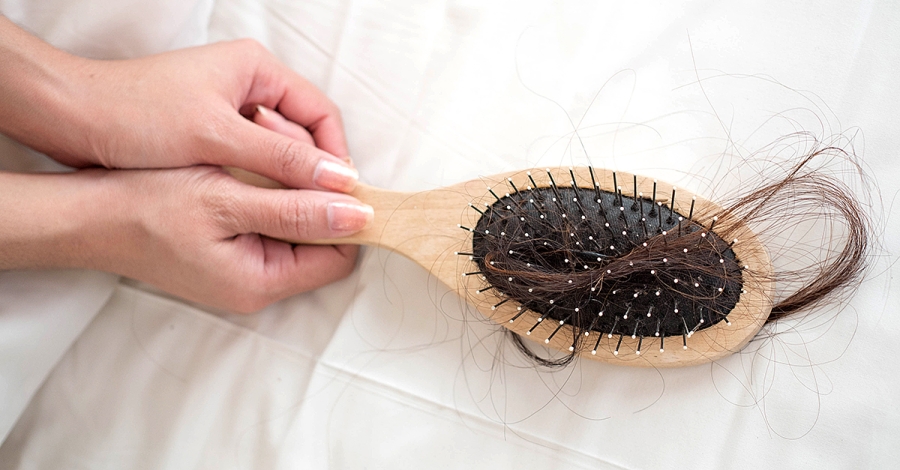
Why is hair falling out?
Usually, genetic factors cause hair loss, but various diseases and incorrect grooming routines can also lead to hair loss. Here are possible causes of hair loss:
Inherited hair loss Poor diet Fungal disease Use of certain medications Dealing with severe stressful situations Excessive weight loss High doses of Vitamin A, Anorexia and bulimia, Hormonal changes, Deficiencies in iron, magnesium, zinc, and B12 Cicatricial alopecia Incorrect hair care
Men are more genetically prone to this condition and have a risk of balding later in life. Hair loss typically begins after puberty and occurs less frequently in women than in men. Breastfeeding and menopause can trigger hair loss. Additionally, activities that expose hair and scalp to excessive heat, such as blow-drying and curling irons, can also cause hair loss.
What are the types of hair loss? There are two types of hair loss:
Cicatricial hair loss; It typically develops along with skin or systemic diseases and causes persistent hair loss. Bacterial, fungal, or viral infections affecting the skin can cause this. Moreover, some inflammatory diseases of unknown origin also play a role in the development of this condition. Non-cicatricial hair loss has no obvious disease, and this type of hair loss is not persistent. Symptoms such as redness and swelling are not observed. Androgenetic alopecia, known as male-pattern hair loss, causes the closure of hair follicles and results in persistent hair loss.
How to prevent hair loss? To have healthy, non-shedding hair, you need a healthy body, scalp, and hair follicles. General health-improving measures also benefit hair health.
Healthy eating and consuming quality foods Regular sleep Staying away from stress or effectively managing stress Using appropriate shampoo and conditioner for your hair structure Gently combing hair when dry
These methods reduce hair loss. However, if hair loss doesn't improve, seeking medical help is necessary. If a disease is diagnosed, following an appropriate treatment plan is essential. Vitamin supplements or a program to address hormonal imbalances could be part of the solution. Correct diagnosis and treatment can prevent the issue of hair loss.
What helps against hair loss? Regular use of medically prescribed medications reduces hair loss and prevents it. These medications strengthen weak hair strands and thicken thin ones. Another method, called mesotherapy, involves injecting vitamins, minerals, and regulatory substances into the scalp via needles. This method strengthens hair strands and fights against hair loss.
Do herbal methods prevent hair loss? Accelerating scalp circulation can prevent hair loss. Some herbal oils can be massaged into the scalp to increase circulation. Plant-based oils, such as olive oil and coconut oil, both strengthen hair follicles and alleviate hair loss problems. Additionally, boiling rosemary and using the water also strengthens hair follicles and prevents hair loss.
However, these herbal treatment methods are effective only if the hair loss is not advanced. If the hair loss is advanced, consulting a doctor and starting treatment is necessary.
How to treat hair loss? Firstly, it must be correctly diagnosed. This involves taking detailed medical history and conducting examinations. Alternative treatments are considered based on the examination results, selecting the most suitable for the patient. These treatments start with their management and consultation, if there are other causes. After the resolution of systematic diseases and their healing, hair loss diminishes.
What should those experiencing hair loss pay attention to? Above all, it's essential to monitor the extent of hair loss. The person needs to determine whether the shed hair is normal or exceeds the necessary amount, counting how many strands fall daily and whether it exceeds 100 strands. If the quantity of hair decreases and the shedding rate is too high, consulting a dermatologist immediately is essential.
Intensive hair loss can be a sign of a disease. Therefore, if faced with such a situation, seeking medical advice is necessary before attempting to stop hair loss with self-methods. If there is another underlying cause, this must be addressed first, and then the problem of hair loss can be tackled.
What diseases can indicate hair loss symptoms? Hair loss can be a symptom of several conditions that develop poorly in the body. Vitamin and mineral deficiencies are observed in individuals experiencing hair loss. Anemia, hormonal disorders, rheumatic, and infectious diseases can also cause hair loss.
Is hair transplantation a solution for hair loss? Hair transplantation is currently one of the most widespread methods for combating hair loss. It involves placing hair strands under the scalp. It's considered the most effective solution against persistent hair loss and baldness.
Leave a Reply
Please fill in the required fields. *